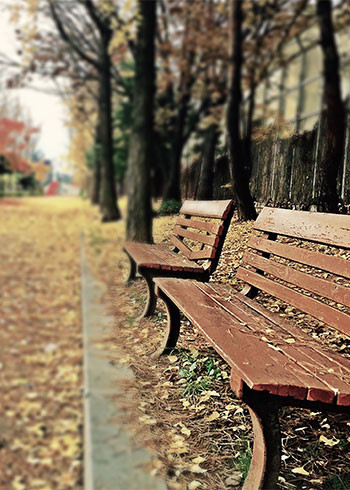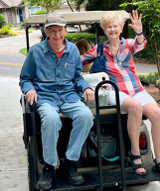Responding to Life
When my parents died in 2002, within two weeks of each other, my sisters and I received advice from bereavement counselors and others who had suffered family loss. We were cautioned not to make any sudden changes in our lives. Often, we were advised to maintain as much of a status quo as possible for the first year following their deaths.
None of us had ever been very successful at living according to the conventional wisdom, but floundering in the sea of grief, one clings desperately to any life raft in sight, and we each took turns comforting each other and reminding ourselves to hold steady as the onslaught of emotion and sorrow ebbed and flowed.
For each of us, the effort this required seemed almost superhuman. Individually, we had been shaken down to our core. The physical loss of our parents notwithstanding, the experience of witnessing each of their declines from devastatingly horrific illnesses was enough to throw our very concepts of existence into severe chaos. It demanded re-examination of our priorities in every facet of our lives—from life purpose to lifestyle, career choices to relationships, and everything in between.
We were told that these feelings were normal, a natural stage of the early grieving process. The fact that we had experienced the loss of both parents, and early in our lives (we were aged 31, 29, 25 and 22 respectively), simply heightened this natural reaction. Supportive and experienced relatives and friends and counselors maintained that it was important to be gentle and forgiving of ourselves and to just focus on nurturing ourselves and each other during this difficult time. But above all, we were to minimize any further change or upset in our lives.
I, for one, having been my mom’s primary and my dad’s secondary caregiver, was exhausted, and I certainly felt no desire to do anything more than was absolutely required in life at the time. I was the administrator of my mom’s estate, and was concerned with getting that taken care of as effortlessly as possible, as well as accomplishing the sometimes overwhelming task of simply getting out of bed each morning to go to work.
But no matter how hard I tried, I could not comfort myself with the everyday routine of my life as I knew it. The experience of housing my mother while she died, coupled with my unfulfilled needs during the grieving process, only further revealed my incompatibility with my live-in partner at the time. The stark reminder of my own mortality led me to despise the inordinate amount of time spent at a job I had already found deeply dissatisfying. I realized that many of my life choices had been made from a place of fear and need for security, and that the security I had craved was insubstantial and empty in contrast to what I now realized was the only thing that endures beyond death/love, happy memories and intense living moments. In short, I felt I had been delivered a wakeup call to action, when the majority of people around me continued to emphasize the necessity of inaction.
In the end, each one of us threw all the advice out the window. We now all joke about the fact that we each did everything you are not supposed to do following the loss of a parent. Within the first year, we each moved out of our houses, changed jobs, three out of four of us ended major relationships, and two of us got married.
As I approach another anniversary of their deaths, I look around me, and I feel wonderful about this new life I find myself in, as if the period of intense grief and change was like a fire I emerged from. I am different, stronger, with a whole new understanding about myself, my life, my values and my goals. I don’t regret any of the change I effected during that fragile time. On the contrary, I am grateful for the currents of energy arising from the deaths of my parents, which in turn freed me of my old patterns.
I’ve discussed this with my sisters more than once, and they share my perspective. Essentially, we were advised not to respond instinctively to primary changing events in our lives. One of the most common advice phrases found in any bereavement pamphlet is, “Postpone major life changes.” The examples vary, but most identify something along the lines of, “Try not to make any major changes such as moving, changing jobs, remarrying or having children.”
Why not???
I believe that the actual sentiment behind the advice is sound, but has gotten lost in the words of the advice: Be mindful in every decision you make. You are undoubtedly in transition. As the dust settles, you will begin to see more clearly. This major event in your life, like all major events in your life, is transformative. Take care and be conscious of this journey. Do not be careless.
But categorically advising us to postpone major life changes diminishes, or at least de-emphasizes, the empowering, transformative nature of the death experience for those left behind. We humans have always had a struggling love/hate relationship with change. Deep down, we know that change is necessary for growth, but it is often diametrically opposed to another primary instinct: security. Perhaps more than anything in the world, death shatters our notion of security.
Much has been said and written about the method by which our society processes and acknowledges death and its impact on the survivors. In contrast to many cultures, we display a great lack of observance of death, almost to the point of denial. Anyone I’ve spoken with who has suffered a close loss attests to this. While there is an extremely short period of time in which the world around us formally recognizes our loss, after a few days, little more is offered to us to remind ourselves that we are, indeed, going through a gradual and often debilitating process.
Death in this culture is often treated like a blip on the event horizon, symptomatic of our deep-seated, collective fear of death. Our society is getting better at coming to terms with this process, and bereavement counselors and other supportive organizations lead the way toward a healthier, holistic understanding of death. But I strongly believe that our approach needs to be reworked, and a much greater emphasis should be placed on the positive, empowering experience of surviving loss.
Death is as integral a part of our experience as birth. It is the universal inevitability of this life. If we continue to treat it as an experience to brace ourselves against, or as something to just “get through” until the intensity of the experience passes, we are not harnessing its power.
Death and its accompanying grief pull us to the edges of existence and experience. It offers us a window into a wider reality. It provides us with a perspective of our own life and inevitable death, which we had previously not been as in touch with. Death is not something that happens in spite of our lives. It is a primary component of our life experience. It is meant to be experienced intensely and responded to completely.
Anti-depressants are often prescribed to people suffering great loss to provide them with the ability to cope and function during the aftermath and the suffering. During a time that was almost unbearable, I came very close to filling a prescription my doctor had written for Zoloft. As I mentioned previously, during the months following my parents’ illnesses and deaths, my dissatisfaction with major elements in my life was intensified. My spirit could no longer accept the choices I had made and was continuing to make, coupled with the most intense grief I had ever experienced.
I have always been wary of prescription anti-depressants, and going that route felt out of character to me. I somehow managed to make it through that darkest time without filling the prescription, and that alone gave me the confidence that I would, somehow, get through it all in the end. It also gave me the courage to peer at my life from an edgier perspective. Everything appeared more vividly to me. I felt my breath in a more intense way, I felt the bonds of love in a more tangible way, and of course, I felt my pain and dissatisfaction in a more dramatic way.
I responded to this heightened state of existence while I was in the midst of it, and I made dramatic life changes. If I had waited to act upon my perceptions until after I felt the storm had passed, I don’t know that I would have felt the necessary impetus to do so. While I can recall my state of being during that time, I only feel glimpses of it now.
By the same token, if we postpone our responses to life’s immediate impact, we are only responding to our recollections of the impact. Certainly, it probably results in less dramatic change and much less disruption to our temporal security. But I fear this practice of coping ultimately prevents individual progress and further contributes to our fear of death and change. And we miss out on the gift of the message of the experience. Simply stated, responding to death is responding to life. And that, I can attest to, is an infinitely empowering lesson.
---------Please leave any feedback on our Facebook page--griefdigest
ABOUT THE AUTHOR
Anne has worked in the field of film and video for thirteen years, most recently as co-producer and business manager at ZAP Zoetrope Aubry Productions. Some of Anne’s producing credits include Exposing the Juarez Murders: The Making of ‘Bordertown’; The Music of ‘Apocalypse Now’; and The Masterpiece That Almost Wasn’t—an acclaimed documentary examining the origin, production and impact of the film The Godfather. However, Since the birth of her first child in 2008, her primary work has been that of full-time mom.
Anne lives in Marin County, California, with her husband, Matt, and their son, Zev. She became interested in our cultural attitudes toward death, mourning and grief after her parents died within two weeks of each other in 2002—her mother of brain cancer and her father from a brain injury and related complications he suffered while undergoing minor surgery.
REPRINTED FROM AN EARLIER EDITION OF GRIEF DIGEST




